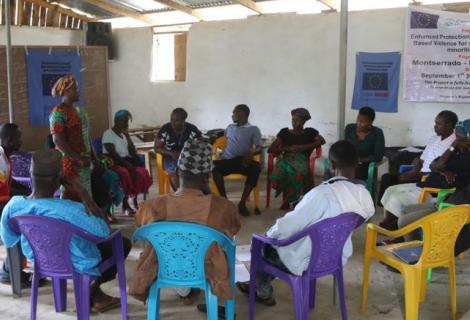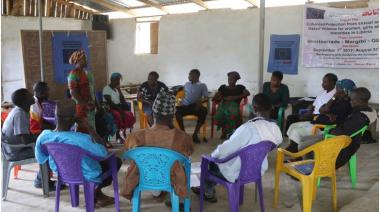Women Leadership Reduces SGBV

The case of AAL Womens' Forums
Grassroots women’s groups often explore the knowledge and expertise coming from community traditions. This constitutes a very different approach to knowledge-building than mainstream knowledge systems, which tend to base expertise on scholarly credits and professionalism. Mainstream knowledge systems are very often more about controlling and packaging knowledge than about testing if it really works on the ground. Thus, grassroots groups have access to valuable knowledge and expertise that is often hard to obtain. They usually have precise and accurate information on their communities which helps them to tackle. In Gbarpolu County, women have managed to navigate the often difficult terrain of influencing culture and traditions which have contributed not only to increased rights awareness and defense of women space in the community but also done a lot in reducing violence against women and girls as well as other community tradition centered prejudices.

Grassroots women’s groups often explore the knowledge and expertise coming from community traditions. This constitutes a very different approach to knowledge-building than mainstream knowledge systems, which tend to base expertise on scholarly credits and professionalism. Mainstream knowledge systems are very often more about controlling and packaging knowledge than about testing if it really works on the ground. Thus, grassroots groups have access to valuable knowledge and expertise that is often hard to obtain. They usually have precise and accurate information on their communities which helps them to tackle. In Gbarpolu County, women have managed to navigate the often difficult terrain of influencing culture and traditions which have contributed not only to increased rights awareness and defense of women space in the community but also done a lot in reducing violence against women and girls as well as other community tradition centered prejudices.
From AAL and CHI’s experiences in the EPS Project, it has become evident that, problems can be solved when you know them. Through the women’s forum and girls clubs, knowledge of the underlying causes of SGBV have gone a long way in transforming culture and traditions. Therefore, adequate and accurate information is the basis for shifting power at community level. Communities are increasingly choosing women as leaders, because they tend to be more effective. In addition, women’s leadership tends to operate on an all-inclusive and team-oriented basis. Everyone’s needs and contributions are taken into account. Structures tend to be flexible and fluid and less bureaucratic.
Women’s leadership often results in the benefit of the whole community as evidenced in the Smith Town. Under women’s leadership, resources are more likely to reach those who need them the most which is clearly demonstrated by how the funds provided to the women’s forums in the eight communities which have supported both urgent needs for women and community members including food security and education.
What the project has done: Through a three year project titled[1]” that ActionAid Liberia is implementing in partnership with Community Health Initiative (CHI) and with funding support from the European Union, the project has set up and supported rural women and girls platforms in order to address SGBV. The project whose objective is to enhance protection from sexual violence and other forms of SGBV including rape, domestic violence, forced marriage, and female genital mutilation for women, girls and sexual minorities in Liberia has seen AAL and CHI organizing and training women to form collectives known as women’s forums, community leadership and girls collectives known as girls clubs.
These structures have been critical in enabling enhanced participation of women and leadership at community level. In addition, through the women’s forums and girls clubs, power was shifted from male leaders with women increasingly influencing decisions at community level, thereby reducing high prevalence of SGBV cases. In communities like Smith Town, the role of women in transforming behavior and attitudes provided a platform for shared leadership and creation of safe spaces for women. The project also managed to contribute to the transforming of power relations in the targeted communities of Gbarpolu County. Power is such an important factor in social, political and economic relations. Those who wield and control power tend to lead and can set rules, norms and guide social behavior through it.
Training programs: The project managed to equip women and girls with knowledge on their rights. It also targeted community leaders who have power and influence over decisions and activities carried out under their jurisdiction. The project activities such as SGBV awareness raising and sensitization helped change behavior and attitudes of men and boys as well as spouses and community leaders on women. Vices such as rape which had been high in the communities was eliminated as women influenced community leaders to put in place laws that enhanced women and girls’ protection especially on rape and wife beating. In addition, the project also managed to increase women and girls’ active agency and leadership which created space for them to advocate for women’s rights and increased protection from sexual and gender based violence in the three communities of Gbarpolu.
Women’s Leadership: There is need for more actions that expand the set of opportunities and enhance women’s decision-making power within the household and community for example, through self-help savings and loans groups that boost the flow of capital and support women’s businesses, to cooperatives providing access to training and new markets, to village education groups providing adult literacy classes. There is need for approaches that support actions that explicitly challenge the social norms and behaviors that, often irrespective of social status, continue to constrain female agency within the family unit and community at large. These actions can significantly shift the balance of local norms that in turn creates new space for women to express their agency. Actions might include women’s groups agitating about norms around age at marriage, seeking legal recourse on oppressive dowry practices or promoting women’s suitability for greater community leadership.
Increase investment in women leadership: Investing in women grassroots leadership has potential to turn the tide against rampant sexual and gender based violence in Liberia as it is rooted the promotion of public good. Resources and capacity strengthening of women in rural communities will empower them to agitate for increased role in decision making and leadership. In addition, there is strong need for building grassroots women leadership to enable power shift that will reduce pro-patriarchal tendencies and decisions that affect women’s welfare
Safety: In a world where violence is often targeted towards women, the issue of safety plays an important role in women’s organizing. Women's groups worldwide are developing strategies against domestic violence and assault in public spaces. Fear and feeling unsafe are major obstacles to the empowerment of women. Enabling women to feel safe is a prerequisite to citizenship.
ActionAid Liberia in partnership with CHI have been supporting women’s forum in eight communities for the past three years. These have been integral in transforming power and shifting it more towards women and girls to end SGBV and enhance access to justice.
